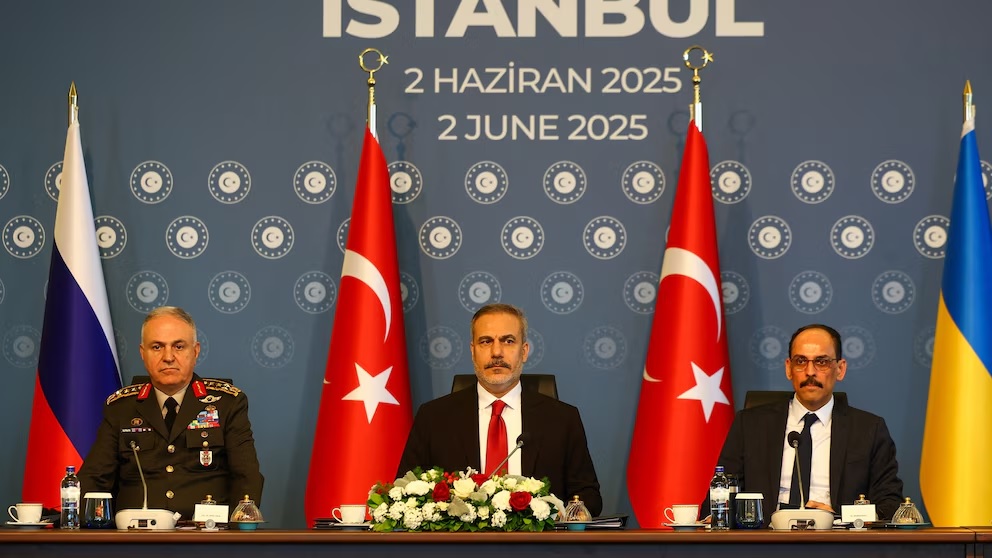Russian and Ukrainian reconvened in Istanbul, Turkey, on Monday, June 2, 2025, to resume another round of U.S.-mediated peace talks aimed at ending Russia’s ongoing three-year invasion of Ukraine.
The renewed discussions took place just a day after Ukraine launched a major drone strike on Russia’s strategic bomber fleet.
This is one of the most significant attacks of the war to date.
Despite pressure from President Donald Trump’s administration, previous rounds of talks have failed to produce a lasting ceasefire or a formal peace agreement.
The last face-to-face meeting between Ukrainian and Russian negotiators, also held in Istanbul in mid-May, marked their first direct contact since the spring of 2022.
On Monday, Ukraine’s Defense Ministry confirmed to ABC News that the new round of discussions was being held at Istanbul’s Ciragan Palace.
Ahead of the meeting, U.S. Secretary of State Marco Rubio spoke with Russian Foreign Minister Sergei Lavrov.
The State Department stated the call occurred “at Russia’s request,” during which Rubio reiterated Trump’s appeal for continued direct negotiations aimed at achieving lasting peace.
Russia’s Foreign Ministry reported that Lavrov and Rubio exchanged views on various political settlement proposals.
However, Ukraine is pushing for a 30-day full ceasefire to facilitate serious negotiations, an idea that Russia has rejected.
The Kremlin, led by President Vladimir Putin, continues to demand the annexation of four additional Ukrainian regions, the retention of Crimea, Ukrainian demilitarization, and a permanent ban on Ukraine joining NATO.
Ukrainian President Volodymyr Zelenskyy announced that Defense Minister Rustem Umerov would lead the Ukrainian delegation.
Zelenskyy outlined Ukraine’s objectives for the talks: a complete and unconditional ceasefire, the release of prisoners, the return of abducted children, and preparation for a high-level summit to secure lasting peace.
Zelenskyy has consistently accused Putin of deliberately derailing peace talks, especially since Trump returned to office in January, promising to end the war swiftly.
However, Trump’s threats of additional sanctions have so far failed to alter the Kremlin’s objectives.
Zelenskyy and his European allies continue to press the Trump administration for increased sanctions on Russia and greater military support for Ukraine.
Keith Kellogg, Trump’s envoy on the Ukraine-Russia issue, expressed the administration’s frustration, telling ABC News that Trump is increasingly irritated by what he sees as Russian intransigence.
While Putin told Trump in May that Russia would present a “peace memorandum,” Moscow has yet to deliver it.
Meanwhile, Russian negotiator Vladimir Medinsky claimed on Sunday that Russia had received Ukraine’s version of the document.
Since the previous round of negotiations, tensions have escalated.
Trump labeled Putin “absolutely crazy” and criticized Zelenskyy, saying, “Everything out of his mouth causes problems, I don’t like it, and it better stop.”
Oleksandr Merezhko told ABC News that Russia is using the talks to dodge sanctions while preparing for a summer offensive.
Merezhko is a Ukrainian lawmaker and head of the parliamentary foreign affairs committee.
According to Merezhko, Putin’s strategy is twofold: simulate interest in negotiations to avoid sanctions and diplomatic isolation.
On the other hand, he also hoped Trump will eventually withdraw U.S. support for Ukraine, leaving it vulnerable.
The new talks follow Sunday’s Ukrainian drone strike on Russian bomber bases—a bold operation reportedly planned for over 18 months.
Ukraine’s Security Service (SBU) said attack drones, hidden in truck containers, struck multiple bases deep within Russia.
The SBU claimed over 40 military aircraft were hit, including 34% of Russia’s cruise missile-capable bombers.
Speaking at a summit with the Bucharest Nine and Nordic countries in Lithuania, Zelenskyy said the strike demonstrated that Russia must “feel losses” to be pushed toward diplomacy.
He emphasized the attack was both a challenge and an opportunity for peace, especially as Russia had just launched its summer offensive.
Russia’s Defense Ministry called the drone strike a “terrorist attack” and claimed it repelled the assault in three regions.
However, videos shared by the SBU showed several aircraft burning at airfields in Irkutsk and Murmansk.
Russian authorities also reported two railway bridge collapses and train derailments near Ukraine’s border, which they blamed on explosions that killed at least seven people.
Zelenskyy praised the drone attack as a “brilliant operation,” calling it a necessary act of defense.
He stressed Ukraine’s readiness for peace and said the U.S.-backed ceasefire proposal had been on the table since March 11, but it was Russia that chose continued aggression.
“Pressure is truly needed—pressure through sanctions, military force, and diplomacy,” Zelenskyy insisted.
Ivan Stupak, a former SBU officer, warned that Russia would likely retaliate with mass drone strikes or missile attacks.
He doubted the attack would affect negotiations, pointing to ongoing Russian ground offensives aimed at capturing more territory to gain leverage.
Meanwhile, overnight missile and drone assaults continued.
Ukraine’s air force reported that Russia launched 80 drones and four missiles, with 52 neutralized.
Russia claimed it shot down 162 Ukrainian drones across nine regions. The war grinds on even as the two sides talk peace.







